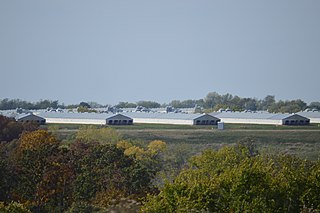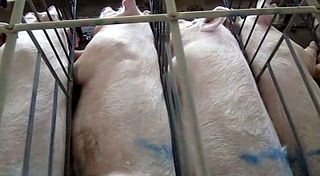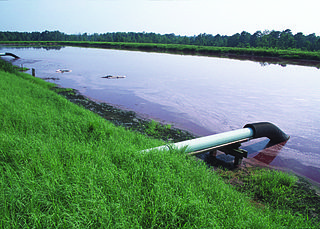Related Research Articles

Intensive pig farming, also known as pig factory farming, is the primary method of pig production, in which grower pigs are housed indoors in group-housing or straw-lined sheds in establishments also known as piggeries, whilst pregnant sows are housed in gestation crates or pens and give birth in farrowing crates.

The American Veterinary Medical Association (AVMA) is an American not-for-profit association founded in 1863 that represents more than 105,000 veterinarians.

In animal husbandry, a concentrated animal feeding operation (CAFO), as defined by the United States Department of Agriculture (USDA), is an intensive animal feeding operation (AFO) in which over 1,000 animal units are confined for over 45 days a year. An animal unit is the equivalent of 1,000 pounds of "live" animal weight. A thousand animal units equates to 700 dairy cows, 1,000 meat cows, 2,500 pigs weighing more than 55 pounds (25 kg), 10,000 pigs weighing under 55 pounds, 10,000 sheep, 55,000 turkeys, 125,000 chickens, or 82,000 egg laying hens or pullets.
An anaerobic lagoon or manure lagoon is a man-made outdoor earthen basin filled with animal waste that undergoes anaerobic respiration as part of a system designed to manage and treat refuse created by concentrated animal feeding operations (CAFOs). Anaerobic lagoons are created from a manure slurry, which is washed out from underneath the animal pens and then piped into the lagoon. Sometimes the slurry is placed in an intermediate holding tank under or next to the barns before it is deposited in a lagoon. Once in the lagoon, the manure settles into two layers: a solid or sludge layer and a liquid layer. The manure then undergoes the process of anaerobic respiration, whereby the volatile organic compounds are converted into carbon dioxide and methane. Anaerobic lagoons are usually used to pretreat high strength industrial wastewaters and municipal wastewaters. This allows for preliminary sedimentation of suspended solids as a pretreatment process.

The pig, also called swine or hog, is an omnivorous, domesticated, even-toed, hoofed mammal. It is named the domestic pig when distinguishing it from other members of the genus Sus. It is considered a subspecies of Sus scrofa by some authorities, but as a distinct species by others. Pigs were domesticated in the Neolithic, both in East Asia and in the Near East. When domesticated pigs arrived in Europe, they extensively interbred with wild boar but retained their domesticated features.
Smithfield Hog Production Division, formerly Premium Standard Farms, Inc. (PSF), is a subsidiary of Smithfield Foods, Inc.
Smithfield Foods, Inc., is an American pork producer and food-processing company based in Smithfield, Virginia. It operates as an independent subsidiary of the Chinese multinational conglomerate WH Group. Founded in 1936 as the Smithfield Packing Company by Joseph W. Luter and his son, the company is the largest pig and pork producer in the world. In addition to owning over 500 farms in the US, Smithfield contracts with another 2,000 independent farms around the country to raise Smithfield's pigs. Outside the US, the company has facilities in Mexico, Poland, Romania, Germany, Slovakia and the United Kingdom. Globally the company employed 50,200 in 2016 and reported an annual revenue of $14 billion. Its 973,000-square-foot meat-processing plant in Tar Heel, North Carolina, was said in 2000 to be the world's largest, slaughtering 32,000 pigs a day.

Proposition 204 of 2006, or the Humane Treatment of Farm Animals Act, was a law enacted by the voters of Arizona by means of the initiative process. It requires that pigs and calves used for veal on factory farms be given enough room to turn around and fully extend their limbs. The Act was approved in a vote held as part of the 2006 Arizona state elections, held on November 7. It passed with over 62% support.

A gestation crate, also known as a sow stall, is a metal enclosure in which a farmed sow used for breeding may be kept during pregnancy. A standard crate measures 6.6 ft x 2.0 ft.

Industrial agriculture is a form of modern farming that refers to the industrialized production of crops and animals and animal products like eggs or milk. The methods of industrial agriculture include innovation in agricultural machinery and farming methods, genetic technology, techniques for achieving economies of scale in production, the creation of new markets for consumption, the application of patent protection to genetic information, and global trade. These methods are widespread in developed nations and increasingly prevalent worldwide. Most of the meat, dairy, eggs, fruits and vegetables available in supermarkets are produced in this way.
The Iowa Department of Natural Resources is a department/agency of the U.S. state of Iowa formed in 1986, charged with maintaining state parks and forests, protecting the environment of Iowa, and managing energy, fish, wildlife, land resources, and water resources of Iowa.
Intensive animal farming, industrial livestock production, and macro-farms, also known as factory farming, is a type of intensive agriculture, specifically an approach to animal husbandry designed to maximize production while minimizing costs. To achieve this, agribusinesses keep livestock such as cattle, poultry, and fish at high stocking densities, at large scale, and using modern machinery, biotechnology, and global trade. The main products of this industry are meat, milk and eggs for human consumption.

Pig farming, pork farming, pig production or hog farming is the raising and breeding of domestic pigs as livestock, and is a branch of animal husbandry. Pigs are farmed principally for food and skins.
Risk assessment for organic swine health is the process of evaluating the likelihood and potential impact of various factors that may affect the health and well-being of organic swine. Risks associated with organic swine farming may differ to those associated with non-organic swine farming, and is of increasing relevance due to growth in the sector. While organic swine farming makes up a small share of U.S. swine farming overall, numbers have increased significantly in recent years. Additionally, non-certified organic swine herds are not accounted in official statistics. Consumer demand, stemming from the larger organic agriculture movement has helped spur growth in this industry.

Direct Action Everywhere (DxE) is an international grassroots network of animal rights activists founded in 2013 in the San Francisco Bay Area. DxE uses disruptive protests and non-violent direct action tactics, such as open rescue of animals from factory farms. Their intent is to build a movement that can eventually shift culture and change social and political institutions. DxE activists work to "put an end to the commodity status of animals."

Animal welfare in the United Kingdom relates to the treatment of animals in fields such as agriculture, hunting, medical testing and the domestic ownership of animals. It is distinct from animal conservation.

The environmental impact of pig farming is mainly driven by the spread of feces and waste to surrounding neighborhoods, polluting air and water with toxic waste particles. Waste from pig farms can carry pathogens, bacteria, and heavy metals that can be toxic when ingested. Pig waste also contributes to groundwater pollution in the forms of groundwater seepage and waste spray into neighboring areas with sprinklers. The contents in the spray and waste drift have been shown to cause mucosal irritation, respiratory ailment, increased stress, decreased quality of life, and higher blood pressure. This form of waste disposal is an attempt for factory farms to be cost efficient. The environmental degradation resulting from pig farming presents an environmental injustice problem, since the communities do not receive any benefit from the operations, and instead, suffer negative externalities, such as pollution and health problems. The United States Agriculture and Consumer Health Department has stated that the "main direct environmental impact of pig production is related to the manure produced.
Ventilation shutdown (VSD) is a means to kill livestock by suffocation and heat stroke in which airways to the building in which the livestock are kept are cut off. It is used for mass killing — usually to prevent the spread of diseases such as avian influenza. Animal rights organizations have called the practice unethical. The addition of carbon dioxide or additional heat to the enclosure is known as ventilation shutdown plus (VSD+).
Feedback is a common practice used in the pork industry where infected deceased pigs and their manure are fed to breeding pigs. It is also called controlled oral exposure or sometimes oral controlled exposure. It is done in an attempt to make the breeding pigs garner some degree of immunity to circulating diseases. There is no standard protocol, resulting in some swine researchers calling the procedure potentially risky and noting that it is often done in an unsafe manner. The practice has also been criticized by animal welfare and animal rights groups calling it disturbing and/or unethical.

Foam depopulation or foaming is a means of mass killing farm animals by spraying foam over a large area to obstruct breathing and ultimately cause suffocation. It is usually used to attempt to stop disease spread. Foaming has also been used to kill farm animals after backlogs in slaughtering occurred during the COVID-19 pandemic. Foam depopulation has been used on poultry and pigs and has seen initial research for use on cattle. It has faced criticism from some groups. Some veterinarians have called it inhumane, along with many animal rights and animal welfare organizations who cite the pain caused by suffocation or the harm experienced by the stray survivors.
References
- 1 2 "Iowa Select Farms". National Hog Farmer. Retrieved December 12, 2021.
- 1 2 3 4 "Homegrown Iowa". Iowa Select Farms official website. Retrieved December 12, 2021.
- 1 2 Charlie Mitchell and Austin Frerick (April 19, 2021). "The Hog Barons". Vox. Retrieved December 12, 2021.
- 1 2 3 Mitchell, Charlie (2021-04-12). "How one company and way too many pigs destroyed America's heartland" . Retrieved 2024-03-01.
- ↑ "Dust busters: Trees, technology help Iowa Select Farms control odors". The [Fort Dodge] Messenger. Retrieved December 12, 2021.
- ↑ "Iowa Select Farms provides update on supply chain interruptions". National Hog Farmer. June 11, 2020. Archived from the original on 2023-05-05. Retrieved December 12, 2021.
- ↑ "More than 2,900 Veterinary Professionals Call on AVMA to Prevent Brutal Ventilation Shutdown on Farms". ASPCA (American Society for the Prevention of Cruelty to Animals. December 15, 2020. Retrieved December 12, 2021.
"Ventilation shutdown: A humane depopulation method". Poultry World. August 9, 2017. Retrieved December 12, 2021.
Eric Gingerich (2015). "What is Ventilation Shutdown (VSD/VSD+)?". Veterinarians Against Ventilation Shutdown. Retrieved December 12, 2021.
Malinda Larkin (August 25, 2021). "HOD recommends depopulation policy sent to expert panel for further consideration". JVMA News. American Veterinary Association. Retrieved December 12, 2021.
Glenn Greenwald (May 29, 2020). "Hidden Video and Whistleblower Reveal Gruesome Mass-Extermination Method for Iowa Pigs Amid Pandemic". The Intercept. Retrieved December 12, 2021. - ↑ "Ventilation shutdown definition". Law Insider. Retrieved December 12, 2021.
- ↑ Baysinger, Angela; et al (August 15, 2021). "A case study of ventilation shutdown with the addition of high temperature and humidity for depopulation of pigs". Journal of the American Veterinary Medical Association. 259 (4): 415–424. doi: 10.2460/javma.259.4.415 . PMID 34337957 . Retrieved December 15, 2021.
{{cite journal}}: CS1 maint: numeric names: authors list (link) - ↑ Iowa General Assembly. "House File 519". Cornell College and League of Women Voters of Iowa. Retrieved 2024-03-01.
- ↑ Jay Wagner (May 3, 1995). "Plan a good compromise". Des Moines Register. Retrieved 2024-03-01.
- ↑ "Deb and Jeff Hansen Foundation". Iowa Select Farms. Retrieved December 12, 2021.